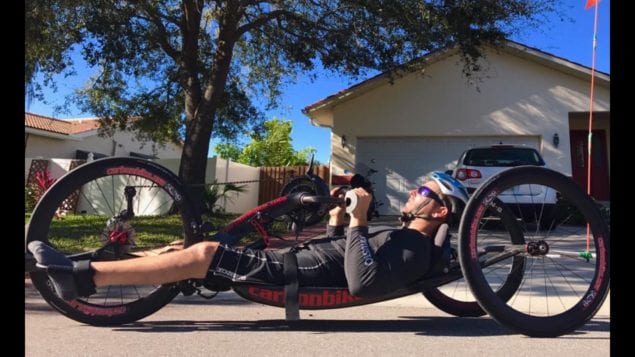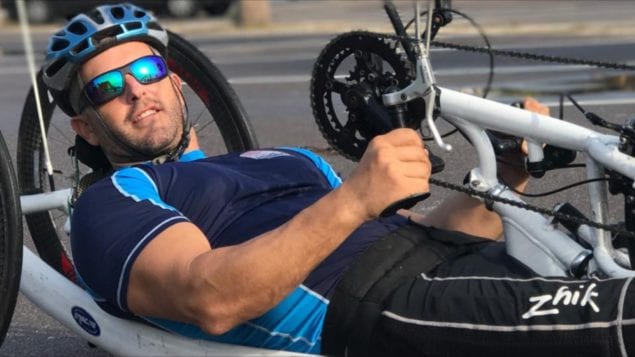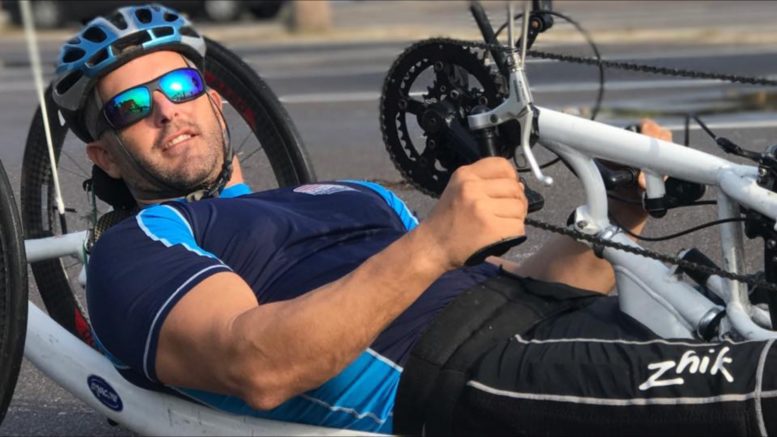
So often at the Fitbit Miami Marathon and Half Marathon, produced by Life Time, the premier healthy lifestyle brand, it is the stories behind the times that matter most.
Daniel Evans is a 40-year-old ex Marine from Miami. He joined the Marines out of high school like so many kids do and was deployed in Brazil 20 years ago when a crane cable snapped and dropped a 200-pound helicopter part on top of him. He was instantly paralyzed.
Now Evans hand-cycles in Marathons, working daily to find the maximum speed his body will allow him to attain. His next challenge is the Fitbit Miami Marathon on January 27, 2019 along the streets of downtown Miami, Miami Beach and Coconut Grove.
“I wasn’t real serious about this at first,” Evans said. “It was more to be fit. But I definitely enjoyed it. I started doing a bunch of races and got better and better at it. Then the last two years, I started training more seriously.

“My level went from way down here to way up there. You can get fast if you put in the effort. I decided I wanted to see what my best is. That has been my goal ever since.”
Goals push all athletes to the edge, including disabled athletes. Evans was grinding hard at the Palm Beaches Marathon in early December when he took a turn too fast, hit a curb and flipped his cycle, sending him flying off. He rolled himself back to his cycle and found the chain disconnected. Fortunately, a couple of onlookers raced over and helped him quickly fix the chain and get back on the cycle. He was back on his way, moving at about 20.1 mph all the way to the finish line, where he still recorded a personal best time of 1:18:36 for the 26.2-mile race, good enough for second place among the several dozen hand-crank cyclists entered in the race’s Disabled division.
“Probably lost about two minutes,” Evans said of his accident. “Didn’t have a lot of time to be scared. You brace for impact and look back. It happened that fast. If you are OK, you get going again.”
Evans was drawn to helicopters as a kid, which lured him to jointhe Marines when he finished high school. One year into his service, he was deployed to Rio De Janeiro to fly the press corps around during President Bill Clinton’s visit to Brazil. He was part of a Marine unit that transported helicopters around the globe and was stationed out of Camp Lejeune in North Carolina.
The giant Marine helicopters were transported in massive C-5 transport planes. But before they could be moved, major parts had to be disassembled in order to fit into the plane. That is what was being executed on the day of Evans’ accident. Evans and his crew were in the process of removing fuel tanks, 11 blades and a gear box from a helicopter about to be transported back to the United States.
“My memory is still a little vague about what exactly happened,” Evans says two decades later. “We were using a Brazilian crane and the cable snapped as we were positioning it. The block at the bottom that holds the hook weighs a couple hundred pounds and was 25 feet up in the air. I happened to be directly below it.”
“It comes down and hits me and crushes three vertebrae (T7, T8, T9). I also had a compound fracture of my left femur, so the bone was sticking out of my coveralls, punctured through my clothing. That was the gory part of the thing. My ribs were also punctured. I had two collapsed lungs. I was instantly paralyzed.”
“You can’t see that you have a broken back. I was unconscious. When I came to, I was out of it. I was in a really weird mental state. I was trying to get up. My buddies were holding me down, telling me not to move. I could see my leg was broken, but couldn’t feel it.”
Obviously Evans’ life changed along the long road back to recovery, shuttling between military hospitals and surgeries. He learned how to use a wheel chair and adapt to a new life back home in Southern Maryland.
He started paralympic sailing, whichbrought him to Miami in 2012. He has been in South Florida ever since.
One day, Nathan Cruz, who is part of the South Florida chapter of the Achilles International organization which encourages the disabled to participate in mainstream athletics, came by to learn how to parasail.
“At one point I saw his hand cycle and took it for a spin around the parking lot,” Evans said. “It was great. I thought it would be nice to get into that. The VA helps you get a bike. And I have been cranking ever since.”
The cycle is now the source of motivation that drives him through the simple daily struggle of being paralyzed.
“I hope I am making the best of everything,” Evans said. “If not, I think I am aiming in the direction of being the best I can be. That’s my number one thing, to get to the top of what I can physically with all the parameters I can control about that. I just want to get to my body’s maximum capability. Then I’ll look around and see where I stand in the U.S. and the world.”
“It’s a struggle. I don’t know when you make that transition away from that. When something happens to anyone that is detrimental, you do eventually have to get over it. You can’t worry about whose fault it is. You have to stop feeling sorry for yourself. Once you do that, you have a really good chance to live a somewhat normal life. Once you do that, you have won the battle.”
The hardest part of his journey, which will continue at the Fitbit Miami Marathon and Half Marathon, produced by Life Time, the premier healthy lifestyle brand?
“The self consciousness of being in a wheel chair,” Evans said. “I am not sure you ever get over that. It doesn’t seem like it can ever completely go away.”







Comments are closed.